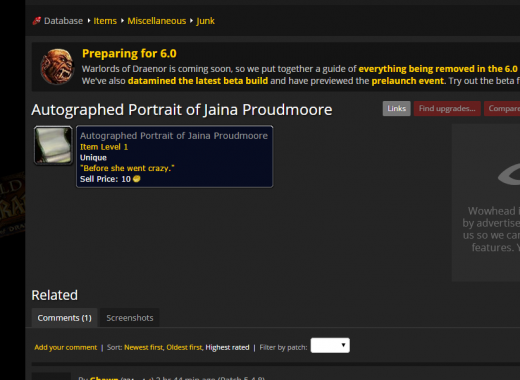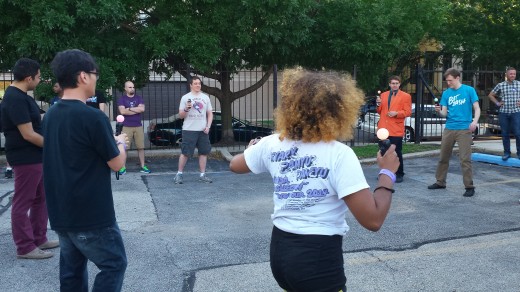
A screencap of an item on Wowhead.com, called An Autographed Portrait of Jaina Proudmoore. It has flavor text that reads, “Before she went crazy.”
This is about a photograph.
But not really.
It’s about a fake photograph from a fictional woman, in the hands of a gaming company that made her, who also made her the butt of a joke.
But not really.
It’s about how we continue to talk about women, and how we talk to women in gaming spaces.
I had, perhaps naively, thought that when I quit World of Warcraft that it meant that I had a certain freedom to leave it behind and never talk about it again. But the problem is that even if I walk away from the game, the shittiness that permeates some of it and the community at large is still there. I still have friends and acquaintances who deal with this stuff. So while I gave up making World of Warcraft my 24-hour job in terms of combating sexism, seeing the continued effects of it ricochet around just makes me sad. In a positive way, it gives me a new freedom to address the subject in a more complete way.
Perculia, Wowhead‘s site director, is one of the more visible women in the World of Warcraft fan community. She runs a site that is the largest database for World of Warcraft as well as an informative news site about updates to the game. She’s good at her job herding digital cattle, whether it’s keeping up on news culled from developer’s Twitters, coallating data from a new beta patch or putting the massive amount of information in the database together in a relevant, clever way. She is an extremely important person in the game’s community as well as to the game itself - even Blizzard’s own employees use Wowhead to look for stuff. Despite not playing the game anymore, I still like to keep up with what she’s doing.
On Wednesday afternoon, she brought up a seemingly unimportant gray item that had come in the latest beta update for Warcraft’s Warlords of Draenor expansion. For those who aren’t familiar with the game, Jaina Proudmoore is one of the few prominent female leaders in the game’s canon, who has had many appearances in the overall world story of this popular MMORPG. However, her story took a bit of a turn between the last expansion, Mists of Pandaria as well as a tie-in novel, Tides of War. The powerful mage suffered a tragic levelling of her port outpost by an opposing faction using a mana bomb and has gone on the offensive since then, struggling with her own anger and grief. Whether or not she’s a moral person at this point is up for debate (as she also jailed and hurt neutral-aligned blood elf mages, staged military motions against the Horde) but within the game’s own lore, she’s not very different from other warring male NPCs with the same narrative prominence. However, many of the game’s players have taken Jaina’s turbulent actions since the bombing of Theramore as proof of her being “crazy” and have cracked jokes along those lines.
It’s obvious that this item is in reference to that, but despite protests from players that this is merely a joke on Blizzard’s audience, I don’t believe it. Jaina has become one of the more polarized characters in the game and there’s no mystery as to why - she’s a woman with extremely strong emotions. Prior to this latest character arc, she was powerful but she also was very loyal to a more pacificist, neutral approach to relations between the two factions in-game. Blizzard has done a pretty mediocre job respecting that change with nuance or sympathy, despite characters with far more morally bleak outlooks (see Garrosh Hellscream, leader of the Horde) garnering equal or greater spotlight and admiration. If Blizzard is cracking wise on their fanbase, which I don’t buy for a second, they would have to have a position distinguishable from who they are parodying. That’s how satire works.
One of the things that eventually drove me away from World of Warcraft is just that kind of jokey disregard for many of the under-utilized female characters that the game boasts as well, combined with an overall lack of understanding of their female audience at times. Seeing them continue to make little jabs like this at a character who’s gone from being made fun of for being a bookish nerd, to being made fun of as a “slut” because fans think multiple male characters were interested in her, to being too peaceful, to now being too crazy, is really disheartening. There’s also just the fact that underneath all of this is that she’s a woman, and that’s enough for players to dislike her. Having the company who created her undermine pride in who she is doesn’t send a very good message to Jaina fangirls as well as the rest of the community. What this really says is less about one particular fictional character but more about the real people who wrote her, the real people who thought this item was a good idea, and this has a ripple effect throughout an already pretty sexist community. Because it’s not really just about how we represent and treat fictional women, but moreso how it makes us look at real women.
Perculia bringing this item to light sparked not only enough discussion to get Warcraft to put in a fix immediately (to be updated in a future patch) but also a round of detractors, harassers and other miscreants who generally hate it when anyone criticizes the game, especially for reasons that have to do with things like sexism. That’s what this is, in case it wasn’t clear. It might have been a joke, but it wasn’t very funny to everyone and it was just another moment when women (and their mental health) were the punchline. Seeing Perculia deal with harassment for almost two days now over something that amounts for passing disappointment for a company she works closely with is more indicative of the problem than some flavor text. It might have been a throwaway item but over time little things like this just add to the constant river of shit you have to deal with as a woman trying to play this video game, if not video games in general. The item, as well as her tweet, has shown up on a noteable cesspool known as the MMO Champion forums, which stoked anti-“SJW” mockery and keeps bringing in fresh waves of people to berate her (but notably not as harshly to the devs who spoke to her about the change) or troll her about caring about it. It’s sad.
When I started poking at the larger game community outside of the insular crowd of Warcraft players, I thought that maybe some of the things I’d seen being an outspoken feminist would have gotten slightly better but then the last month happened and shattered that belief. What happens within WoW’s borders is nothing different than what happens when Anita Sarkeesian makes a new video. The only difference is that instead of finding lots of different female journalists, media critics or game developers to fixate on, WoW’s community often only has a scant few women who work for big fansites, post on the forums, or make fan works like YouTube videos. Instead of someone like Zoe Quinn being a target, I’ve seen people harassing Trade Chat on Twitter or post derogatory comments on Liz Harper’s editorials. I even caught a lot of flak when I brought up Ji Firepaw having sexist dialogue back in Mists of Pandaria. Big game companies have just as much responsibility to diversify their works as they do to make sure their fans feel safe discussing and criticising their company, especially when so many women (and other marginalized populations) put in so much time and work promoting their products and making them accessible to other players. I’d even say it’s a responsibility despite it potentially costing the loyalty of other segments of their audience.
At the end of the day, fans of World of Warcraft are no different than someone who writes for Polygon or makes indie games if we’re all talking about women. Gaming has a sexism problem, whether it’s towards real women or fictional ones and the two are intimately connected, no matter what we think. And as much as I’ve seen progress, we still have a long way to go.
Really.

